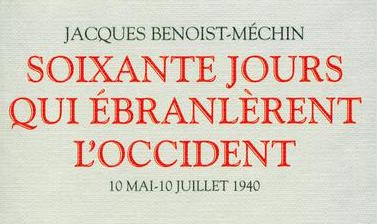The release of Dunkirk has been the focus for mixed reviews and divided opinions. Christopher Nolan’s movie with its clean-shaven, well-washed, un-muddied British soldiers retreating with their weapons still in hand, though loved by critics, has been derided by veterans of WWII as a travesty. To see Dunkirk merely as an “heroic retreat” is to fail to see it for what the event really was.
It may well seem to some a saga of human survival, with hardly a glimpse of the Germans and no sight of the French, let alone the Belgians. The British, to fight another day, abandoned Europe; the Europeans remained to suffer under occupation.
However, the controversy brought to mind a remarkable book, a classic of French historiography from 1956, Sixty Days that Shook the West: France 1940 May–June 1940. This only appeared in the US and Great Britain in a heavily abridged one volume edition (559 pages), now out of print.
However, for Europeans, the complete text of the three volumes of 60 Jours qui ébranlèrent l’Occident (Bouquins / Robert Laffont, €30), running to 1,056 pages, is still available: twice as long and three times as detailed.
Now the name of the author, Jacques Benoist-Méchlin, may not be familiar. But he has a small place in the folklore of Irish literature. In his early 20s he moved in the same circles as James Joyce, and it was to him that Joyce remarked at the end of 1921 that he had filled Ulysses with enough enigmas to keep the professors busy for centuries.
He was also a friend of Proust and Claudel. However, Benoist-Méchlin was then a journalist, working largely for the Hearst organisation. This important book belongs to his later guise as an historian.
The author had already written in 1936 a three volume admiring history of the German army – part of which de Gaulle later had reprinted for the use of the French officer corps. But he was also an admirer of Hitler, whom he saw (as so many then did) as a bastion against Communism. In 1940 he himself wholly supported the Vichy regime, in which he was a minister, to the extent that he plotted to get rid of Laval to strengthen it. After the war he was tried and sentenced to death, but was reprieved and later released. Not then in the eyes of many today an admirable person.
This book belongs, however, to his mature years of reinvention as a serious historian, but one with a lingering admiration of strong men and great rulers, Alexander, Kemal Ataturk, Ibn Saud, Muammar Khadafy.
But Sixty Days is something else again. It is a day by day, almost hour by hour, account of what went wrong in the early months of 1940 when the “phoney war” came to an abrupt end.
Not one war
Benoist-Méchlin sees what happened as not one war, but three wars, distinct and separate: a Belgian war, a British war and a French war. The leaders of these counties acted in isolation, and fought for their own ends. This thesis makes astonishing sense of the confusion of what was for the French, in any case, a fearful replay of La Débâcle, the collapse of 1870.
Benoist-Méchlin himself at the time hoped for the emergence of a stronger Europe, one which would be better fitted to defeat Communism.
Though the author’s own politics in the pre- and war-time years are unappealing, his skills as historian make his book important. He has been called “a revisionist”. But in reality he was writing the truth, a complicated truth, as he saw it. In effect he was as much a actor in the events as was Churchill – who does not by the way appear in Dunkirk. In Benoist-Méchlin’s scenario, Dunkirk is not a triumph of human survival, it is merely one event in a total disaster.
The contrast between what happened, as Benoist-Méchin saw it, and how Nolan recreates it, is sobering. With Great Britain again retreating from Europe, and the government of Poland shaping up, with warm Catholic support, to create yet another dictatorship, if there are lessons to be learnt from history it is not politicians or film makers who learn them.


 Peter Costello
Peter Costello
